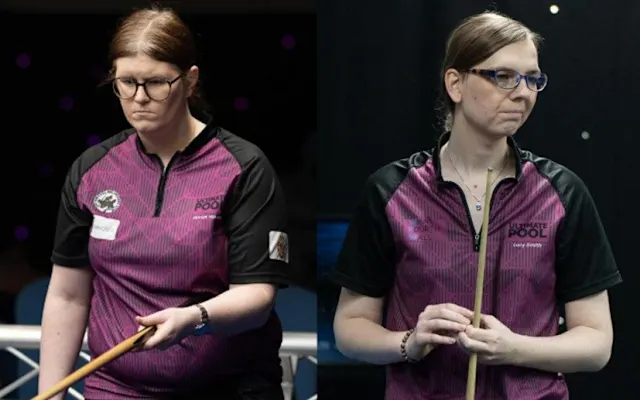In a striking example of how far women’s sports have shifted, two transgender pool players—biological males identifying as female—competed in the final round of a women’s professional tournament in the U.K., defeating every female competitor along the way. The April 6, 2025, event, part of the Ultimate Pool Women’s Pro Series in Wigan, England, ended with Harriet Haynes defeating Lucy Smith 8-6 in what critics are calling a symbolic collapse of competitive fairness.
This isn’t just about pool—it’s about the larger issue of whether women’s sports can remain women’s sports if males, however they identify, are allowed to dominate them.
A Final Between Two Biological Males
Haynes and Smith each beat four female opponents to make it to the championship match. These transgender pool players—though legally competing under current policy—have reignited the long-standing debate over the integrity of female competition when biological males are allowed to enter the field.
While cue sports may not appear physically demanding at first glance, professional players and commentators point out that even subtle advantages like hand size, arm reach, and upper-body strength can influence the game. Critics argue that these factors tilt the playing field in favor of male-born competitors, even in a precision sport like pool.
Women Protest as Sports Become Politicized
Spectators and female athletes alike voiced their frustration at the event. Chants of “Save Women’s Sports” erupted from the stands as it became clear that the final was an all-male showdown in what was supposed to be a women’s competition. Among the most vocal critics is veteran player Lynne Pinches, who previously forfeited a final match against Harriet Haynes in 2023, citing a clear competitive disadvantage.
“I’m speaking up for women who’ve had enough of being erased from their own sports,” Pinches said during a protest interview. “We train, we sacrifice, we show up, and we get knocked out by someone who wouldn’t even rank in the men’s division.”
Even former U.S. college swimmer Riley Gaines weighed in, likening the event to a “real-life South Park episode,” in a tweet that quickly went viral.
Transgender Pool Players and the Erosion of Fair Competition

The inclusion of transgender pool players in women’s divisions has been justified in the name of diversity and inclusion. However, critics argue that this inclusivity has gone too far and now undermines the very reason women’s categories exist—to give female athletes a fair shot at success. If you think this is crazy, you should read about the transgender who won the state championship in pole-vault in Maine!
Unlike open competitions where gender is irrelevant, women’s leagues were established to ensure that females, who are at a natural biological disadvantage compared to males, have their own space to thrive competitively. As more biological men enter women’s sports and dominate, fewer biological women get to make finals, win titles, or even compete at elite levels.
Calls for Policy Reform
The Ultimate Pool Group, the event’s organizing body, currently allows competitors to participate based on their gender identity. But as cases like this draw national and international scrutiny, pressure is mounting to reevaluate those rules.
In the U.S., 24 states have passed laws requiring athletes to compete based on their biological sex, not gender identity. Advocates for similar action in the U.K. argue that without clear policy protections, more women will be sidelined.
“This isn’t about hatred or exclusion—it’s about fairness,” said Kellie-Jay Keen, a women’s rights campaigner. “If men can take over our sports, what’s next?”
Conclusion
The dominance of transgender pool players in a women’s professional championship highlights the growing tension between inclusion and fairness in modern sports. With biological males sweeping female events under the guise of gender identity, many are asking: Where do women draw the line?
Until governing bodies face the reality of biological advantage, women’s sports will continue to suffer—not from lack of talent or effort, but from policies that prioritize politics over fairness.